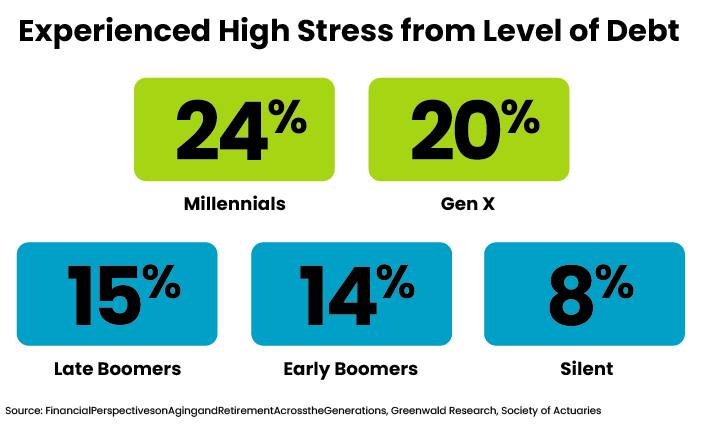Although older Americans as a group have suffered greater medical trauma from COVID-19 than younger Americans, a five-generation survey released yesterday by the Society of Actuaries (SOA), finds older generations have felt less of a negative financial and emotional impact from the pandemic.
According to the survey, “Financial Perspectives on Aging and Retirement Across the Generations,” 33% of late boomers (born 1955 to 1964), 29% of early boomers (1946 to 1954) and 25% of the Silent Generation (1935 to 1945) reported the pandemic had a somewhat or significant negative financial impact on them. This compares with 41% of millennials (1980 to 1998) and 39% of Gen Xers (1965 to 1979).
In addition, a smaller percentage of late boomers (40%), early boomers (37%) and the Silent Generation (29%) are very or somewhat concerned with how the pandemic will impact their retirement savings. Millennials are most worried about this (57%), followed by Gen Xers (49%), according to the survey.
The older generations’ biggest retirement concerns are related to long-term care, health issues impacting finances, and inflation. The younger generations are more worried about depleting savings and not being able to maintain a standard of living or afford healthcare.
Managing debt during the pandemic has also been less of an issue for the older generations, the survey finds.

Additional Findings
The older generations also reported less of a negative impact of COVID-19 on their overall feelings of well-being. And just 27% of the Silent Generation, 36% of early boomers and 42% of late boomers reported feeling lonely or isolated, compared with 47% of Gen Xers and 58% of millennials.
The survey did uncover some commonalities across the generations. Nearly half (44%) in each generation say they’re placing greater emphasis on building an emergency fund. Four in 10 in each generation say they’ve reduced their spending.
But despite being relatively optimistic compared with their children and grandchildren, the older generations feel less confident about their finances than they did when this survey was last conducted two and a half years earlier.
For example, early boomers are now less likely to feel in control (42% vs. 52%) and more likely to describe themselves as thrifty (73% vs. 64%). Late boomers are less likely to enjoy managing their finances (43% vs. 51%) or to call themselves an investment pro (21% vs. 32%).
The latest survey also found that Gen X was least likely to work with an advisor in 2020 — just 27% did. This compares with 31% of millennials, 33% of late boomers, 38% of early boomers and 34% of the Silent Generation.
In addition, 13% of late boomers and 17% of Gen X said they do not expect to retire.
Greenwald Research conducted the online survey in January 2021 on behalf of The Society of Actuaries. It included 406 millennials, 405 Gen Xers, 402 late boomers, 403 early boomers, and 401 Silent Generation.







